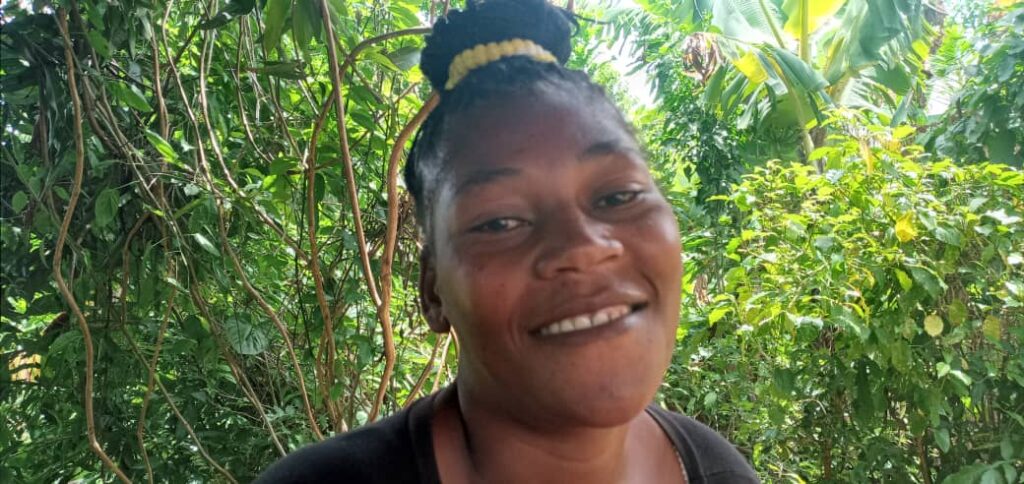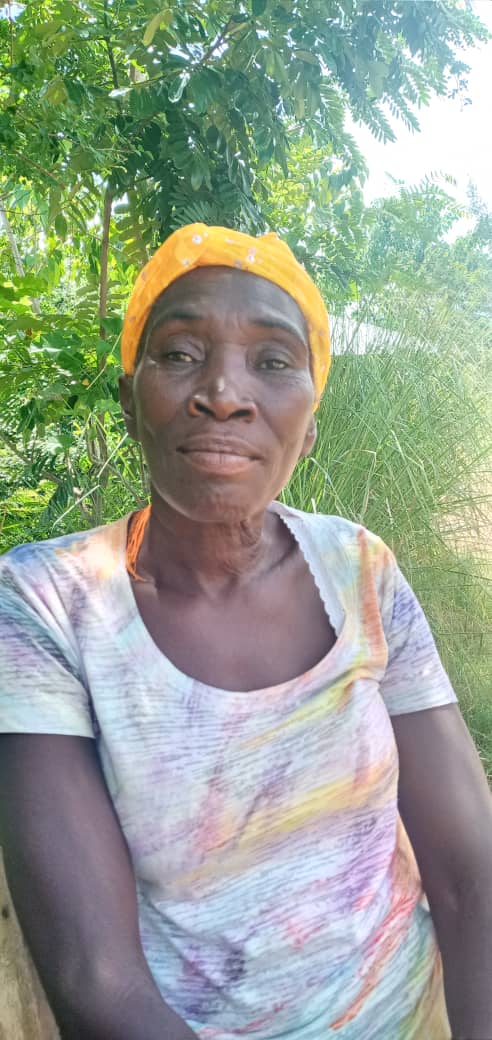Marina Charles is a widow. Her children are grown, but she has four grandchildren living with her. Their home is in Bisent, one of the many small neighborhoods of Laskawobas nestled along the Artibonit and the many small inlets created by the hydroelectric dam in Pelig.
When her husband passed away a few months before the CLM team came to her area, she couldn’t afford a funeral. Various relatives chipped in to hold a small one for her. The couple had been supporting the children through day labor in their neighbors’ fields. It was enough to keep the family fed most of the time, but not much else.
It is still her main source of income. Inflation has driven wages up to 200 gourds for a day’s work, which is about $2, and with that she must feed her family of five and take care of their other needs as well. Last year she was able to send only two of the four children to school. Even so, she has been able to manage the small income well enough to save. She has almost 5000 gourds in the savings and loan association that the CLM team established in her area.
She chose goats and a pig as her enterprises, and she has made modest progress with them. She received two young female goats, and one had a healthy kid. All three are doing well. She received a small sow, but she realized that she has no place secure to raise piglets. Unless you can shut them in somewhere, they get into people’s gardens and cause a lot of trouble. So she decided just to fatten it up rather than breeding it.
In a few months, her savings and loan association will conclude its one-year cycle and pay out both what she has saved and her share of the interest it earned through the loans it provides to members. She plans to put the money from her pay-out together with money from the sale of her sow to buy a small cow. She explains that a cow will be useful because it can be sold to pay for her funeral.
All this is to say that, though she is improving her housing, and though having a latrine and a water filter have brought her family better hygiene, too, the economics of her household have not yet changed very much. She isn’t sure yet what she will do to send the children to school in September. Day labor earns her a consistent, though very small income. And it may continue to do so for some time, as long as she remains healthy. But unless her livestock holdings increase dramatically or she establishes another investment, she will continue to struggle.

Gislène Cénatus is a young mother in Ramye. Like Marina, she is about halfway through the 18-month program.
She’s not from Laskawobas, but from Granbwa, a mountainous area on the southern side of the ridge that separates the Central Plateau from the region around the capital.She lived there with a partner and their three children. The five lived with her inlaws. He own parents had died. But she couldn’t get along with them. She felt persecuted, and her partner always sided with his parents.
So she eventually left. Her two older children stayed with their father, but she went to live with her brother in Ramye with the youngest child, a girl, and her nephew, her deceased sister’s boy. She met Fedgard, her current partner, and became pregnant with her fourth child just before the CLM program came to Ramye.
The couple has really struggled. She would ask he brother to send her food, and he would if he could. Some days, she would just home the kids were fed by neighbors. She herself would go without.
Fedgard earns money sawing hardwood trees into boards for carpenters. He’s hard-working, but there are only so many trees to cut up. He and his partner on the two-man saw do not earn income every day. Gislène had her baby just two months ago, so her ability to work outside the home is limited. She is still breastfeeding the child. She would like to start a commerce. She plans to start small, setting up a tray with onions, garlic, leeks and bouillon-cubes. But feels that she must wait until her baby is weaned.
Like Marina, she chose goats and a pig as her enterprises. One of the two goats she received gave birth to its kid still-born, but the other gave her a healthy young buck. She is doing her best to make sure it stays healthy. She wants to sell it as soon as she can to buy another female. She already bought a third female with savings from her weekly stipend. Four productive females should enable her to create a strong base.
The sow that the program gave her died. Pigs are a risky investment. When Fedgard went to the market with the couple’s case manager to buy a replacement, they couldn’t find another sow, so the bought a small boar instead. Gislène intends to raise the boar until she can sell it to buy a cow. She works hard to do what she can to help it grow and stay healthy. “I give it water to drink, and I prepare its food every day.”
In one way, she is really happy with the collaboration she gets from Fedgard. Though she isn’t making money herself right now, she’s able to save money in her savings and loan association every week because Fedgard always gives her money to contribute. His income is irregular, but he’s well-regarded. “If he doesn’t have the money to give me, he borrows it from one of the association’s leaders.” The couple is building savings steadily. When the association pays out at the end of the cycle, Gislène thinks she will either buy a couple more goats or rent land to plant peanuts on.
She does, however, have one conflict with Regard. Neither her nephew nor her daughter has ever been to school. She feels she should send them in September. “They are the only kids who don’t go.” But she doesn’t have an income, and Fedgard says he won’t help. He says their fathers should pay. Gislène responds that Fedgard took her with both the kids. “He knew they were with me. It looks bad when people see we have children with us who aren’t in school.” It is an ongoing argument between the two, because Gislène is not willing to give up. She and her case manager will need to see how she can negotiate with Fedgard to convince him to help her out.
